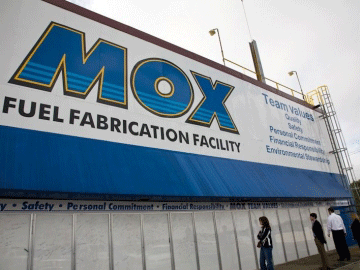One of the concerns over nuclear power that I keep returning to is the incompetence and malpractice of corporations that are members of the nuclear industry. Over and over again, major nuclear corporations have been caught cheating on safety practices, equipment maintenance, construction standards, regulatory requirements, etc. on nuclear projects. Recently, Areva, a French-owned company that is a big player in the global nuclear industry was caught falsifying quality control reports on nuclear plant components from a foundry that it owns.
CB&I Areva MOX is a joint venture of Chicago Iron & Steel and Areva. For the past sixteen years, CB&I Areva MOX (CAM) has been working on a contract in the U.S. for the DoE National Nuclear Security Administration (NNSA). CAM was retained to design, build and operate a facility near the Savannah River in Aiken, S.C. The purpose of the new facility is to combine weapons-grade plutonium and uranium into mixed-oxide nuclear (MOX) fuel for U.S. nuclear power reactors. The project is way behind schedule and way over budget. The work of CAM has been found to be "unsatisfactory" by the United States Department of Energy.
In December of 2016, NNSA completed a project evaluation for the Savannah MOX plant. The evaluation says that CAM made "misleading" and "inaccurate" claims about the state of the project. CAM claimed that the project was seventy percent complete. However, a separate September 2016 report from the U.S. DoE says that the project is only twenty-eight percent complete. In their evaluation, NNSA said, "The contractor was unable to balance project technical baseline requirements with other elements of project performance, such as cost and schedule. The contractor lacked the fiduciary will to plan and execute work to fully benefit the project and taxpayer."
Tom Clements is one of the project's harshest critics. He is director of the Savannah River Watch organization. He said that the NNSA evaluation was “devastating.” And added that he has "never seen an assessment like that. It all but calls them liars"
The Savannah MOX project was a result of an agreement between Russia and the U.S. to reduce their stockpiles of nuclear weapons by using the plutonium from dismantled warheads to create fuel for nuclear power reactors. Critics of the project say that the technology of using weapons-grade plutonium to make fuel is expensive and it does not eliminate the risk of nuclear weapons proliferation which was part of the original justification.
The Savannah MOX project was originally budgeted at six hundred and twenty million in 1999 with a completion date in 2006. It is still at least a decade away from completion and the estimated cost has risen to seventeen billion dollars. It would have to be budgeted at a billion dollars a year at the least in order to be finished.
South Carolina Senator Lindsey Graham is one of the fiercest champions of the Savanna MOX project which brings millions of dollars and hundreds of jobs to his state. He accused Obama of failing to honor the agreement with Russia and even held up the confirmation of Ernest Moniz as Obama's Secretary of Energy over the fate of the project. Last October, Russia withdrew from the agreement to convert weapons-grade plutonium into nuclear fuel.
In President Obama's proposed 2017 budget, he suggested that the Savannah MOX project be canceled. He requested cutting spending on the project from three hundred and forty-five million dollars to two hundred and seventy-five million dollars as the project was being wound down. In its place, Obama proposed a dilute and dispose process for dealing with the weapons-grade plutonium from dismantled U.S. nuclear warheads. With the change in Presidential administration that took place on January 20, 2017, the fate of the Savannah MOX project is uncertain.
